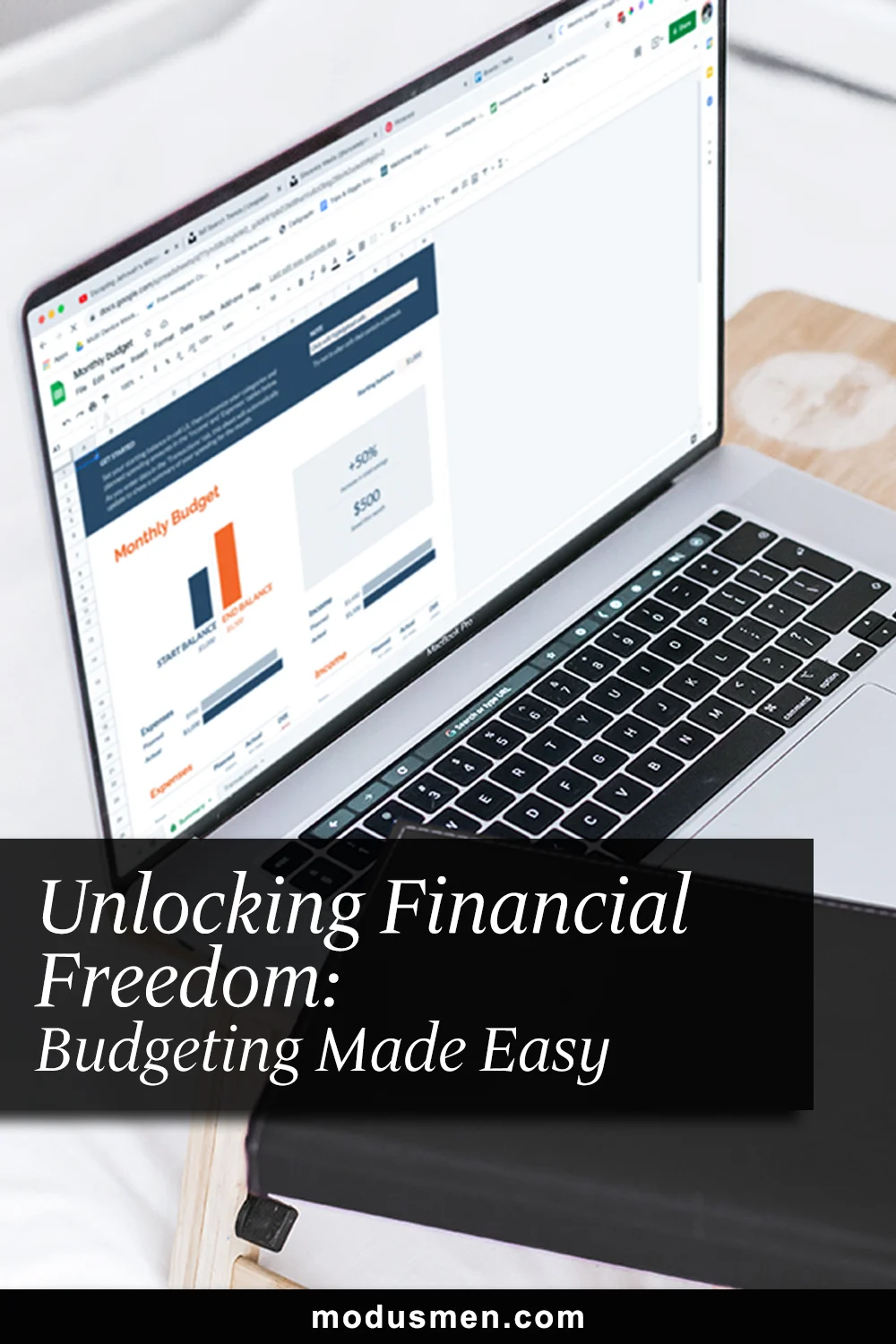
Budgeting for Financial Freedom: Unlock Your Path Today!
Unlocking financial freedom starts with mastering the art of budgeting. In today’s digital age, budgeting for financial freedom has never been easier or more accessible. With a wealth of online resources and free spreadsheets at your fingertips, you can effortlessly implement strategies to take control of your finances. Budgeting doesn’t have to be difficult; it’s about making smart choices and staying consistent. By following essential tips and strategies, you’ll be empowered to achieve financial harmony and success. Let’s dive in and unlock your path to financial freedom!
Why Budgeting is Important
Budgeting is the cornerstone of financial success. It’s not just about tracking expenses; it’s about making informed decisions that align with your goals. Here’s why budgeting is crucial and how it can help you achieve your aspirations:
- Clarity and Control: Budgeting gives you a clear picture of your financial situation. Knowing where your money goes helps you take control and make adjustments as needed.
- Goal Achievement: Whether it’s saving for a dream vacation, buying a new car, or investing in your future, budgeting helps you allocate funds towards your goals. It turns dreams into actionable plans.
- Debt Management: A well-planned budget can help you pay off debts faster. By prioritizing debt repayment, you can reduce financial stress and improve your credit score.
- Emergency Preparedness: Life is unpredictable. Budgeting allows you to set aside an emergency fund, providing a safety net for unexpected expenses.
- Financial Freedom: Ultimately, budgeting is about achieving financial freedom. It empowers you to live within your means, avoid unnecessary debt, and build wealth over time.
By understanding the importance of budgeting and implementing effective strategies, you can take significant steps towards financial freedom and success.
Online Resources and Free Spreadsheets for Budgeting for Financial Freedom
Before we get started, let’s get acquainted with some of the budgeting resources available in the digital age. Thanks to a plethora of online resources and free spreadsheets, you can effortlessly implement the budgeting strategies we’ll discuss and take control of your finances. Let’s explore some of these tools that will help you streamline your budgeting process and achieve financial harmony with ease. With the aid of these resources, you’ll be well-prepared to embark on your journey of budgeting.
Budgeting Apps:
There are numerous budgeting apps available for both Android and iOS devices that can assist you in managing your finances seamlessly. These apps often come equipped with pre-built budgeting templates. Simply input your income and expenses, and the app will automatically calculate your budget allocation, providing a clear overview of your financial health.
- Mint (from Intuit) – Android & Apple iOS
- Rocket Money – Android & Apple iOS
- Goodbudget – Android & Apple iOS
Personal Finance Websites:
Many personal finance websites offer free budgeting calculators and tools that cater to various budgeting methodologies. These websites typically allow you to customize your budget based on your unique financial situation, providing a more personalized approach to budgeting.
- Nerd Wallet Free Budget Planner Worksheet
- Mint (from Intuit)
- Rocket Money
- Empower
Excel or Google Sheets Templates:
If you prefer a hands-on approach, consider using Excel or Google Sheets templates designed specifically personal budgeting. These templates come with pre-built formulas, making it simple to calculate and monitor your budget allocation. Additionally, you can customize these spreadsheets to suit your preferences and add extra columns for further categorization.
For your convenience, an easy-to-use 50/30/20 budget (we’ll explain what the 50/30/20 rule is below) spreadsheet is available from Globe Funder at https://globefunder.com/50-30-20-budget-calculator/. This resourceful tool allows you to effortlessly implement the budgeting rule, enabling you to maintain financial harmony and stay on track towards your financial goals.
Bank Budgeting Tools:
Many banks offer a range of online budgeting tools tailored for their customers. These tools are designed to provide a seamless budgeting experience, allowing you to track your expenses, set financial goals, and analyze your spending patterns directly from your bank’s online platform. By leveraging these bank budgeting tools, you can enjoy the convenience of managing your finances and budgeting with ease, all within the safety and security of your bank’s digital ecosystem.
These online resources and free spreadsheets can be incredibly valuable tools to aid you in your financial journey. Whether you’re using budgeting apps, personalized spreadsheets, or budgeting calculators from personal finance websites, these resources will empower you to manage your finances effectively and stay on top of your financial goals. As you explore these budgeting resources, you’ll find that tracking your expenses, setting financial goals, and analyzing your spending patterns becomes a seamless and rewarding process. So, don’t hesitate to make the most of these valuable tools as you embark on your journey of budgeting.
Know Your Numbers:
To create an effective budget, you must first understand your financial situation inside out. Gather all your financial statements, bills, and receipts to assess your income and expenses. Knowing your numbers will empower you to make informed decisions and set realistic financial goals.
Activity:
Spend an evening gathering and organizing your financial documents. Create a simple spreadsheet or use a budgeting app to track your income and expenses for the last month.
Categorize Like a Boss:
Categorizing your expenses is the key to a well-organized budget. Divide your spending into essential categories like housing, transportation, utilities, groceries, and discretionary items like entertainment and dining out. Assigning each expense to a category will provide clarity on where your money is going.
Activity:
Review your spending from the past month and categorize each expense. Be honest and accurate, as this will be the foundation of your budgeting journey.
Embrace the 50/30/20 Rule:
A The 50/30/20 rule is a timeless budgeting principle that helps you allocate your income effectively, but in today’s economy, it may require some adjustments. The rule suggests dividing your after-tax income into three categories:
- Essentials (50%): Allocate 50% of your income to cover essential expenses like rent/mortgage, utilities, groceries, transportation, and healthcare. These are the fundamental necessities that sustain your daily life.
- Discretionary Spending (30%): Reserve 30% of your income for discretionary spending, such as entertainment, dining out, vacations, and non-essential shopping. This category allows you to enjoy life’s pleasures without overspending.
- Savings and Debt Repayment (20%): Dedicate 20% of your income to savings, investments, and paying off debts. This portion helps you build a financial cushion, plan for the future, and achieve long-term financial goals.
However, in today’s economic landscape, rising costs and fluctuating living expenses may cause the allocation to differ from the traditional 50/30/20 rule. Many individuals find that more than 50% of their income goes towards essential expenses, leaving less room for discretionary spending and savings.
Navigating the Flexible 50/30/20 Rule:
- Reassess Essential Expenses: Review your essential expenses carefully and identify areas where you can cut back. Negotiate bills, explore cost-saving alternatives, and consider making lifestyle adjustments that reduce fixed costs.
- Flexible Discretionary Spending: In today’s economy, it’s essential to be flexible with discretionary spending. Prioritize experiences that align with your values and cut back on non-essential purchases when needed. Consider free or low-cost activities that still bring joy and fulfillment.
- Incremental Savings Approach: If allocating 20% to savings and debt repayment seems unattainable, start with smaller contributions and gradually increase as your financial situation improves. The key is to remain consistent with savings efforts, no matter the initial amount.
- Emergency Fund as a Priority: Building an emergency fund should be a priority, even if it means temporarily adjusting the 50/30/20 rule. Having a financial safety net will provide peace of mind during uncertain times.
- Periodic Budget Reviews: Regularly review your budget to stay in control of your finances. As your income or expenses change, be prepared to adapt your budget accordingly.
The 50/30/20 rule serves as a valuable guide to budgeting, but in today’s economy, it may require flexibility to suit your financial reality. Prioritize essential expenses, be mindful of discretionary spending, and commit to saving for the future. By managing your budget with grace and adaptability, you can navigate the ever-changing economic landscape while maintaining your gentlemanly lifestyle and achieving your financial goals. Remember, it’s the deliberate and informed approach to budgeting that will elevate your financial well-being, even in challenging times.
Activity:
Apply the 50/30/20 rule to your categorized expenses. Adjust the allocations as needed to match your financial situation, goals and preferences.
Set SMART Goals When Budgeting for Financial Freedom:
The key to effective budgeting lies in setting SMART goals – Specific, Measurable, Achievable, Relevant, and Time-bound These principles provide a clear framework for defining your financial objectives and charting a successful course towards achieving them. Let’s delve into each aspect of SMART and explore how to apply it to your budgeting journey with elegance.
- Specific: A SMART goal must be well-defined and precise. Instead of setting a vague objective like “save money,” be specific about the amount you want to save and the purpose behind it. For example, “Save $1,000 for a dream vacation to Italy by next year” is a specific goal that leaves no room for ambiguity.
- Measurable: A goal should be quantifiable, allowing you to track your progress and celebrate milestones. Use concrete metrics like dollars, percentages, or specific dates. Being able to measure your progress keeps you motivated and accountable.
- Achievable: A SMART goal is realistic and attainable. Assess your current financial situation, taking into account your income, expenses, and savings potential. Set goals that challenge you without being overly ambitious. For instance, aiming to save 50% of your income when you currently save 10% might not be feasible, but increasing it to 15% is a more achievable step.
- Relevant: Financial goals should align with your values and long-term aspirations. Ensure that your goals are relevant to your life and reflect what truly matters to you. Avoid setting goals just because they seem fashionable or popular. Choose goals that resonate with your unique journey.
- Time-bound: A SMART goal has a well-defined timeframe, adding a sense of urgency and focus. Set a specific deadline for achieving your goal, and break it down into smaller time intervals for monitoring your progress. This approach prevents procrastination and keeps you on track.
The Application of SMART in Budgeting for Financial Freedom:
Let’s put the SMART principles into practice when setting financial goals. Suppose your dream is to save up for a down payment on a stylish apartment within the next two years:
- Specific: “Save $20,000 for a down payment on a sophisticated apartment in the city by the end of two years.”
- Measurable: Break down your goal into smaller milestones. Aim to save $10,000 within the first year and the remaining $10,000 in the second year.
- Achievable: Evaluate your current financial situation and determine if saving $10,000 each year is realistic given your income, expenses, and potential for additional income sources like side hustles.
- Relevant: Ensure that owning a stylish apartment is in line with your long-term vision and personal values.
- Time-bound: Set a precise timeframe, such as “By July 2025, I will have saved $20,000 for the down payment.”
Activity:
Write down three financial goals for the next six months. Make sure each goal meets the SMART criteria and outline the steps needed to achieve them.
Monitor and Adjust with Finesse:
A budget requires consistent monitoring and occasional adjustments. Track your spending regularly and compare it to your budget. If you find yourself overspending in a category, analyze the reasons and make the necessary changes to stay on track.
Activity:
Create a weekly budget check-in ritual. Spend 10-15 minutes every week to review your expenses, celebrate your progress, and make any adjustments for the upcoming week.
Taking Charge of Your Financial Destiny:
Congratulations on taking the first step towards financial empowerment! By embracing these budgeting for financial freedom tips and utilizing the available resources, you’ve set yourself on a path to financial success. Remember, budgeting is the cornerstone of your financial freedom, and it doesn’t have to be complicated. With your newfound knowledge and practical approach to money management, you’ll confidently navigate your way to financial success. Stay committed to your goals, keep exploring new budgeting tools, and enjoy the peace of mind that comes from having full control over your finances. Here’s to a prosperous and fulfilling financial future!






